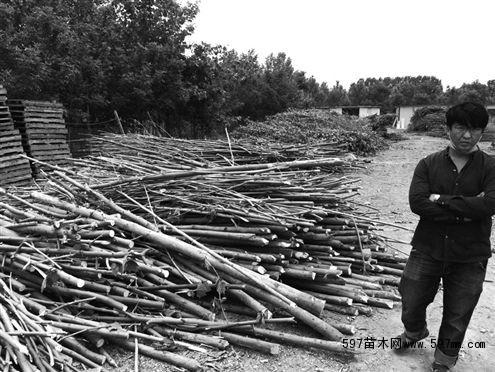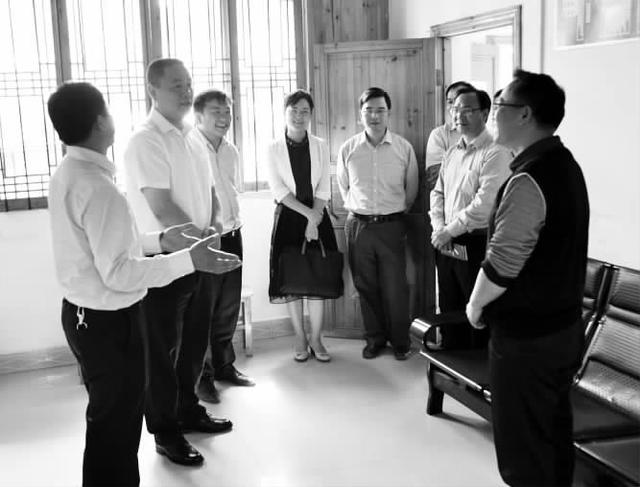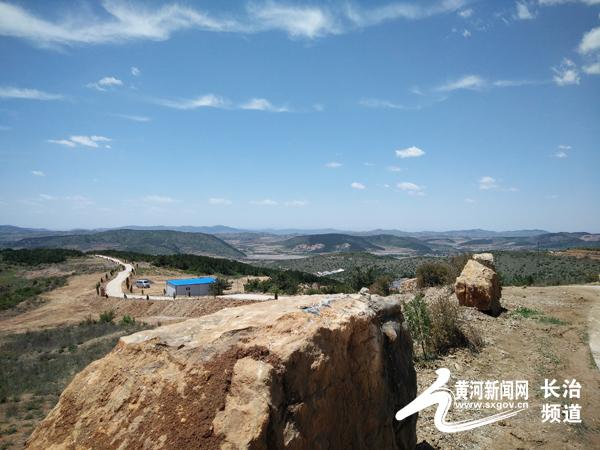The price of seedlings plummeted, Fatong from "cash cow" to waste wood.

The price of seedlings plummeted from "cash cow" to waste firewood.
>
The price of seedlings plummeted from "cash cow" to waste firewood.
>
The tricycle loaded with Fatong trunk drove to the ground, the numbers on the monitor struggled back and forth a few times, and finally fixed on 4208KG, excluding the body weight of 1798KG, and finally the owner of the wood processing factory wrote down the word 2410KG in his yellow workbook.
Because the car Fatong had gone out of branches, leaves and roots, the wood processing factory offered the car owner Zhao Wei the top price of the day: 0.11 yuan per catty. After receiving the payment of 530 yuan, he smiled bitterly, "trees that have worked hard for two years can only be sold as firewood." At this point, the 15 mu of Fatong planted by Zhao Wei has been basically disposed of, with a total income of less than 2000 yuan.
Once upon a time, Fatong-based economic seedlings not only brought considerable benefits far more than grain to growers, but also brought honor and eyeballs to Jining Yanzhou Yan Dian, a professional seedling planting town. But after the peak is the cliff. Since the end of last year, due to the rapid decline in the price of surplus seedlings in the market, coupled with frostbite caused by heavy snow, Fatong can only be sold at a price of a few cents per jin in Yanzhou Yandian Town, Jining, and the "cash cow" has become waste wood overnight.
The story of Zhao Wei is still on. Article / photo reporter Ji Qiang
If you want to be rich, plant many trees
Yandian Town, located in the west of Yanzhou, Jining, is a typical agricultural town at the turn of Yanzhou, Rencheng, Wenshang and Jining High-tech Zone. But there is no sign of grain here, and saplings of different heights cover almost all the fields.
"it is no exaggeration to say that there is not one mu of grain in the village." The villagers of Xiyangyang Village, Yandian Town said. According to reports, as a typical professional nursery stock village, villagers had the habit of planting poplar and paulownia on their own plots a long time ago. After 1998, the nursery stock planting base of the whole village has grown to more than 1600 mu. Although there are different kinds of seedlings, the number of Fatong is particularly large.
Around 2003, West Mianyang Village was the first to open a website that was still new at that time, surfing the planting situation and prices of seedlings in the village, and foreign merchants contacted business through the website, which could bring about 5 million yuan in sales revenue every year.
The local saplings, mainly Fatong, are exported to Beijing, Shanghai, Tianjin, Henan and other places.
In 2007, Xu Hongjun, then secretary of the village party branch, made an account: "for more than a thousand people in the village, the average annual income of planting trees alone reached 4000-5000 yuan. With the addition of migrant workers, it is about 7000 yuan a year."
The habit of planting trees that has been followed has turned the rich West Mianyang Village into a famous star village. Under its leadership, the trend of planting trees began to spread around. Xu Hongguo, director of the local nursery stock association, told this reporter, "at that time, trees were planted in our village, and other places were still corn and wheat. When we saw that planting trees made money, the surrounding villages such as Zhanghai, Mengcun, and Hongmiao also began to imitate. Now the scale of planting trees has even reached other counties and districts, radiating more than 50 kilometers around."
The tree-planting boom has even spawned a special seedling brokerage industry, which contacts customers externally and helps growers sell saplings internally. Xu Hongguo, 38, began to get involved in this industry about 15 years ago. On May 18, in his store, he raised his legs and recalled the prosperity at that time. "at that time, growers really made money, and they randomly planted trees on an acre of land to ensure that water, fertilizer and medicine were treated with water and fertilizer. The profit was the same as playing, planting good varieties and good market, and one mu of land could earn 10,000 yuan." Under the huge profits, brokers also make a lot of money. Xu Hongguo revealed that when the market is best, a tree broker can earn 30 yuan.
Government incentive
Driven by the demonstration village, the planting scale of seedlings in Yandian town continues to expand.
According to the statistics retrieved by this newspaper, as of 2010, there are 3000 mu of newly developed local seedlings, more than 30, 000 mu of seedling planting area in Yandian town, and nearly 20 specialized seedling villages have been formed in the town. A year later, the scale area increased by 5000 mu. After being appraised as "strong Miao Mu Town in Shandong Province", Yan Dian Town proposed to further expand the scale and strive to reach 40, 000 mu.
In an interview in 2015, Liu Xuguo, then deputy mayor of Yan Dian Town, revealed that the area of local seedlings has reached more than 80,000 mu, with nearly 100 seedling varieties, with an annual output value of more than 300 million yuan. "every day, hundreds of cars of Fatong, Baila and other best-selling seedlings are sold to Henan, Jiangsu, Anhui and other parts of the province."
In five years, the planting area of seedlings has nearly tripled. Along with the growing scale, there are also government intervention and incentives.
As early as 2010, Yandian Town constantly mobilized the enthusiasm of farmers to plant seedlings through the accounting comparison between planting trees and planting grain. A more direct incentive measure is to reward 200 yuan per mu per mu for large-scale investment and strong radiation, and to inject private capital into the development of the seedling industry in the form of auction, lease, replacement, and the use of live land policy. " At the same time, the local town party committee and government actively coordinated banks, credit cooperatives and other financial departments, increased support for the seedling industry, and effectively solved the problem of insufficient funds for the development of seedling farmers.
The material incentives were further refined the following year, with local regulations rewarding 150 yuan per mu for continuous development of more than 200 mu of seedling and flower bases, and 100 yuan per mu for fast-growing and economic forests. Under such stimulation, more than 20 specialized seedling villages have been formed in Yandian Town in 2011.
In 2015, Yan Dian Town's attention and support for seedling planting reached its peak.
In March, the local leading group for afforestation work in the spring of 2015 was set up to organize government staff and village group cadres to go to the village to publicize the economic and ecological benefits of afforestation, so as to create a strong atmosphere of afforestation with comprehensive mobilization and everyone's hands.
As of August last year, Yandian Town had formed 45 specialized seedling villages, attracting more than 200 non-local businessmen to develop the seedling industry and leasing 45000 mu of land. "at the same time, we have deepened the reform of the forest right system, completed the main reform and supporting reform of seedlings in the town, successfully set up a cooperation platform for forest banks, broadened forestry financing channels, and made efforts to solve the financing problems of forestry enterprises and forest farmers. in 2014 alone, seedling mortgage loans reached more than 12 million yuan."
The market has changed.
With the encouragement and support of the local government, the seedling industry in Yandian Town ushered in the peak of the development of flowers. It's just that after the peak comes the cliff.
In the impression of the grower Kingdom (pseudonym) in Xiyangyang Village, some foreign capital flowed into the area shortly after the cash incentive policy. "at that time, the cost of leasing land was not high. The cost per mu was NT $500 to NT $600. After large-scale land leasing and planting trees, you could get a reward of NT $200 per mu. Coupled with the income from planting trees, it was almost a business that could not lose money."
Even the local villagers try their best to fight for subsidies and rewards. "the most common thing is to set up cooperatives to bring retail investors together as a whole and reach the scale of rewards." According to the data released by Yandian Town in 2015, there are more than 140 seedling cooperatives in the town. "not all of them are set up for rewards, but there must be a lot of subsidies."
When the scale reached its peak in 2015, the market for seedlings was also quietly changing. "by the end of 2014, the market had already begun to decline, but at that time, the price of Fatong, which is five centimeters in diameter, was still about 20 yuan each. By the end of 2015, the price had reached 5 yuan, and the tree still needed to be sent to the broker." The kingdom said.
- Prev

Sanjiang County: create a good work style and strive for rapid development
Sanjiang County: create a good work style and strive for rapid development
- Next

Hanzhuang Village, Huguan County: based on the advantage of resources to create a high-quality "rural tour"
Hanzhuang Village, Huguan County: based on the advantage of resources to create a high-quality "rural tour"
Related
- A course of planting techniques and methods on how to grow carrots
- How to plant the latest tulips?
- Is it better to pick tea in the morning or in the afternoon? When is the best time for tea to be picked? what is the third or fifth tea?
- Launch Yuanxiao Happy combination Haocha + Tea Yuan healthy Taste
- Penghu Tourism "Fireworks 20 Parade with You"
- 2022 West Lake Happiness holds "Digital Revitalization Voucher" and draws iphone13 and laptop.
- Banqiao Fuzhou social houses are designed to change start-up combined with police elimination to create a safe and livable environment
- The convenient measure of "mechanical weeding" in Xinbei has been abused and the Agriculture Bureau has imposed heavy penalties on the illegal land consolidation.
- Changgeng University Joins Hands with Four Memory Factories to Rescue Memory Talent Shortage
- The list of Taiwan's top 100 MVP managers is listed by the Director-General of the Farmers' Association of Sanxia District.

